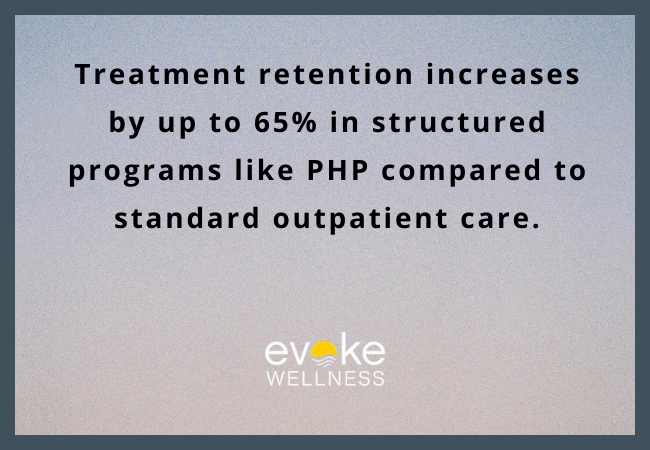Group therapy is one of the most powerful tools in addiction and mental health treatment. In an Intensive Outpatient Program (IOP), where participants are transitioning from higher levels of care or seeking flexible, structured support, the importance of group dynamics becomes especially significant. Group therapy doesn’t just provide emotional insight—it helps individuals form deep connections, combat isolation, and develop the interpersonal skills necessary for long-term recovery.
At Evoke Waltham, we believe that healing happens through community. While individual therapy focuses on personal struggles and history, group therapy offers an opportunity to experience connection and growth with others who understand your journey. This blend of shared experience and therapeutic structure creates a safe, dynamic space for people to express themselves, receive feedback, and build resilience.
In this blog, we’ll explore why group therapy plays such a critical role in IOP, how it enhances the recovery process, and how it sets the foundation for a sustainable life in recovery.
Understanding IOP and Its Purpose
An Intensive Outpatient Program (IOP) is a structured treatment model that allows individuals to receive therapy and support several days per week while still living at home or in a sober living environment. IOP is ideal for those who need ongoing treatment but do not require 24-hour supervision.
In an IOP setting, clients typically attend therapy sessions three to five days a week, for a few hours each day. Treatment includes individual counseling, group therapy, psychoeducation, and skills training. It bridges the gap between inpatient care and full independence, giving people the support they need during a vulnerable stage in their recovery.
Group therapy is a cornerstone of IOP because it encourages open dialogue, shared learning, and community-building in a way that individual therapy alone cannot provide.
The Value of Peer Support in Group Therapy
Addiction often thrives in isolation. Many individuals struggling with substance use or mental health conditions feel misunderstood, ashamed, or disconnected from others. Group therapy directly confronts this isolation by creating a space where people can relate to one another, learn together, and form genuine connections.
Peer support is one of the most validating experiences in early recovery. When someone hears, “I’ve felt that too,” or “You’re not alone,” it dismantles shame and creates an environment where growth is possible. Participants learn that others have faced similar struggles, navigated setbacks, and found ways to keep moving forward.
In group therapy, clients practice vulnerability in a setting that encourages compassion, empathy, and constructive feedback. These sessions often help participants:
-
Build communication and conflict resolution skills
-
Learn from others’ insights and coping mechanisms
-
Explore emotions in a nonjudgmental space
-
Reduce feelings of shame and guilt
-
Establish accountability and routine
These elements are critical to healing—not only from addiction but from the emotional pain and trauma that often underlie it.
Group Therapy Formats and Techniques
At Evoke Waltham, our group therapy sessions are carefully designed to meet the varied needs of our clients. Groups are facilitated by licensed therapists who guide conversations, introduce evidence-based techniques, and ensure a safe, respectful atmosphere.
Some of the most effective group therapy formats used in IOP include:
1. Psychoeducational Groups:
These sessions focus on teaching clients about the nature of addiction, mental health, triggers, and coping strategies. Education empowers participants to understand themselves better and take an active role in their recovery.
2. Skills-Building Groups:
Here, clients learn and practice healthy coping skills such as emotional regulation, mindfulness, assertiveness, and stress management. These are the tools that support sobriety and stability in everyday life.
3. Process-Oriented Groups:
These open discussions allow participants to talk about current challenges, emotional responses, and personal insights. The therapist guides the conversation, but much of the value comes from peer support and shared processing.
4. Relapse Prevention Groups:
Focused on identifying personal triggers, managing cravings, and creating a relapse prevention plan, these groups are essential for maintaining progress and building confidence in recovery.
5. Identity and Self-Esteem Groups:
Exploring identity, values, and self-worth can be transformational in recovery. These groups support the rebuilding of self-esteem and help individuals define who they are beyond addiction.
How Group Therapy Enhances Accountability
One of the most significant benefits of group therapy is the accountability it fosters. When participants commit to showing up and sharing their experiences, they take responsibility not only for their recovery but for supporting others as well.
This accountability isn’t about pressure or judgment—it’s about mutual respect. Knowing that others in the group rely on your presence and input can motivate individuals to stay engaged, remain honest, and push through difficult moments.
Accountability also encourages consistency, which is a key component of lasting recovery. Attending regular group sessions builds structure into daily life and reinforces the importance of continued commitment to personal health.
The Healing Power of Connection
At its core, group therapy is about connection. Many people entering IOP feel emotionally disconnected—whether from their families, their communities, or even from themselves. Group therapy rebuilds this sense of connection and reminds people that they are not alone in their struggles.
Connection helps to regulate emotions, improve self-awareness, and strengthen recovery goals. Participants learn that asking for help is a strength, not a weakness, and that true healing involves being seen and supported by others.
In fact, connection with peers often becomes a crucial recovery tool outside of the therapy room. Many individuals build friendships during IOP that extend into support networks long after formal treatment ends.
Group Therapy and Co-Occurring Disorders
Many people in IOP are also managing mental health disorders alongside addiction, a condition known as dual diagnosis. Group therapy plays a critical role in supporting these individuals as they navigate the complexities of co-occurring conditions.
Therapists facilitate conversations that address both substance use and mental health concerns, helping clients develop a deeper understanding of how these issues interact. For instance, someone dealing with anxiety and alcohol use may benefit from hearing how others manage similar experiences and develop healthier coping strategies.
Through group therapy, individuals can learn how to balance recovery from both conditions while receiving emotional and practical support from others who genuinely understand.
Integrating Group Therapy into Everyday Life
While group therapy is a formal part of IOP, its benefits often extend far beyond the walls of the treatment center. The communication skills, emotional insights, and relationships formed in these sessions prepare individuals for real-world challenges.
After completing IOP, many individuals choose to continue participating in peer-led support groups such as Alcoholics Anonymous (AA), SMART Recovery, or other community recovery programs. These groups provide ongoing encouragement, accountability, and friendship.
Maintaining the habit of group participation helps individuals stay focused on recovery and navigate the ups and downs of daily life with confidence.
Why Peer Support Matters Now More Than Ever
In today’s fast-paced and often isolating world, authentic human connection is more valuable than ever. The COVID-19 pandemic, social media overuse, and mental health stigma have all contributed to a growing sense of loneliness and disconnection for many people.
Group therapy counters these trends by offering a structured, compassionate space where individuals can reconnect with others and with themselves. It reminds us of our shared humanity and reinforces the idea that recovery doesn’t happen in isolation—it happens in community.
At Evoke Waltham, our group therapy model reflects this truth. Every participant is seen, heard, and valued. Together, we create a culture of empathy, accountability, and hope.
Why Choose Evoke Waltham?
Evoke Waltham provides a comprehensive and compassionate Intensive Outpatient Program in Massachusetts that prioritizes evidence-based care and individualized treatment. Our dedicated clinical team includes licensed therapists, case managers, and psychiatric professionals who collaborate to offer holistic support.
We understand the value of connection in the healing process. That’s why our Group Therapy Program in Massachusetts is structured to foster community, safety, and lasting change. Through shared experiences and professional guidance, clients gain the confidence and skills needed to move forward in recovery.
Our IOP also connects clients to ongoing care through referrals, aftercare planning, and resources in the broader recovery community, including long-term Addiction Treatment Programs in Waltham, MA. No matter where you are in your journey, we’re here to help you continue moving forward with strength and clarity.
Conclusion
Group therapy is far more than a scheduled part of an IOP—it’s a vital pathway to healing, growth, and sustained recovery. Through peer support, individuals in early recovery learn to trust, connect, and thrive in ways that were once unimaginable. Whether you’re just beginning your journey or transitioning from a higher level of care, group therapy offers the tools, support, and community you need to succeed.
At Evoke Waltham, we’re honored to walk with you through this process, offering a safe space to grow alongside others who understand your path. Reach out today to learn more about how we can support your recovery journey. Call us at 866.276.1920 to take the next step toward a brighter, more connected future.
Frequently Asked Questions (FAQ):
What is the role of group therapy in IOP?
Group therapy in an Intensive Outpatient Program (IOP) provides a structured, supportive environment where individuals can connect with peers, share experiences, and develop essential coping skills. It fosters accountability, reduces isolation, and promotes emotional growth through shared recovery.
How often are group therapy sessions held in IOP?
Most IOPs include group therapy sessions three to five times per week, typically lasting several hours per session. The frequency and duration can vary depending on individual treatment needs.
Is group therapy effective for dual diagnosis treatment?
Yes, group therapy can be highly effective for individuals with co-occurring mental health and substance use disorders. It allows participants to explore both issues simultaneously while receiving support from others facing similar challenges.
Will I be required to speak during group therapy sessions?
While participation is encouraged, you will never be forced to speak. Group therapy is a safe and respectful space, and your therapist will support your comfort level as you gradually become more involved.
What types of group therapy are included in IOP at Evoke Waltham?
Evoke Waltham offers a variety of group formats, including process groups, skills-building, relapse prevention, psychoeducation, and identity/self-esteem groups—all facilitated by licensed professionals.



